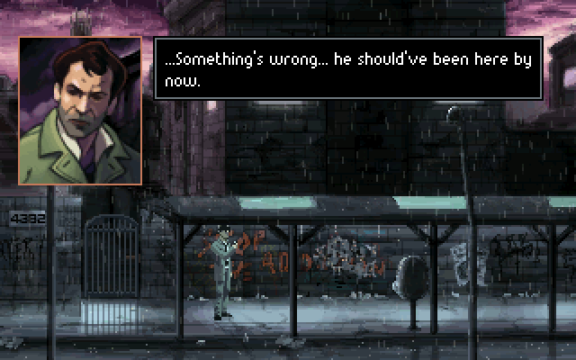
Gemini Rue
Written by: Rik
Date posted: August 19, 2022
- Genre: Adventure
- Developed by: Joshua Nuernberger
- Published by: Wadjet Eye Games
- Year released: 2011
- Our score: 7
Grim and gritty sci-fi adventures with blocky graphics were pretty well represented in the original point and click era. Even digging through this site’s limited archives, we have the likes of Future Wars (an old Atari ST favourite, trickier than I remembered); DreamWeb (which made a big impact on me at the time, despite its flaws); Beneath a Steel Sky (the page for which is a persistent target of spam comments for some reason, maybe in karmic retribution for taking a less-than-generous tone in the review, but from memory the slightly flippant approach of the game kind of annoyed me); and Blade Runner (a big favourite, although I’m possibly in danger of being too emotionally attached, to the extent that I almost dare not fire it up ever again).
To that list we can now add Gemini Rue, one of a raft of new adventures credited with the revival of the point and click genre at the turn of the 00s/10s and published by Wadjet Eye Games, the guys responsible for The Shivah and five instalments of Blackwell (good games one and all). After all their success it’s easy to forget, looking back, that these pixelly adventures did have to fight for their spot in the digital marketplace, with some contemporary discussion featuring comments along the lines that Steam should be reserved for genuine AAA titles rather than supposedly primitive-looking indie games. Typically bird-brained stuff from ‘the gamers’, then, and since proved entirely wrong, of course.
After a brief introduction sequence in which one of our protagonists, referred to as Delta-Six, is shown attached to some vaguely terrifying machinery and about to get his memory wiped, we join the other, Azriel, on a grey and depressing city street, sheltering from the rain and waiting for an old friend who, evidently, isn’t going to show. Clearly, you’re going to have to brave the streets yourself to track him down.
Meanwhile, the action flits back to Delta-Six, who is incarcerated in some kind of secure facility with seemingly little option other than to follow the directions of the sinister Director, i.e. the man who just unplugged your memory box, issued via a public address system. Along the way, fellow inmates tell you different things about the person you were and what came before. I don’t think it’s spoiling too much to say that you made an unsuccessful attempt at escape, for which the brain reset was punishment.
Switching between characters takes place automatically at various points early on, as you’re gradually introduced to each one and their circumstances. Later, you’ll get the opportunity to make that switch yourself at any point during the main bulk of the game, although there’s no requirement to do so and no crossover between the two narratives at this point, with the option more of a chance to switch things up if you’re getting stuck on one storyline and fancy having a go at the other. (If you’re slightly anal and obsessive like me then you can just play through each one in its entirety without interruption).
It’s largely standard point and click stuff, with the slightly clunky Adventure Game Studio engine the only point of slight frustration (I found aspects of the inventory a bit fiddly, even if the opening tutorial did tell me exactly how to do everything some hours previously). Otherwise, though, there’s a degree of flexibility when it comes to how you solve some puzzles, with multiple solutions available on a few occasions, and there are also times when a good old fashioned kick or a blast with your gun is an acceptable brute force solution instead of some convoluted inventory-based alternative.
Other mildly innovative inclusions are the ability to move nearby boxes to help you climb walls or access higher up areas (don’t worry, it’s nothing like the crate fiesta of something like Broken Sword 3) and the need to ask for direct assistance from non-player characters at various points, by ‘using’ them on the thing that you need help with.
There are action sequences, too, the mention of which may draw groans from some, but they act as a reasonable injection of danger and urgency regarding your plight without blocking your progress for too long. Possibly drawing upon the prevalence of the cover-shooter mechanic in bigger-budget efforts at the time, Gemini Rue delivers its own take, as you’re required to pop down behind crates, walls and doorways and then out again in order to exchange fire with bad guys at various points.
A preview of these sequences is provided in a training environment that’s baked into the story of the game, so you’re given a consequence free opportunity to practice before either character has to use these skills under pressure. On the default settings you won’t just sail through them mindlessly, but they shouldn’t detain you for too long, and you do have the option to turn the difficulty down if you’re struggling.
Either way, Gemini Rue autosaves before these sections, and indeed in the handful of other places where death is possible. It’s a case of perilous situations being flagged and having believable consequences rather than anything too unfair or punishing, and in general we’re talking about either hiding or escaping, with a small amount of time pressure, rather than anything too harsh or stressful.
The story beats are fairly familiar: law and order has broken down, society is controlled by a gang called the Boryodukan (which never seems to quite roll off the tongue) and the two main environments on offer are a bleak rainy city and a bleak correctional facility. There are nods to Blade Runner, extending to the music at times (although some of the piano bits made me think – bizarrely – of American Beauty) and all kinds of other popular sci-fi. But it’s all pretty well done, and credit is deserved for a commitment to playing things straight and pulling it off.
Voice work is fairly solid, with Brian Silliman’s delivery as Azriel embodying the gruff and grumpy hard nut detective, although as the outtakes (available via the director’s commentary option) suggest, there is a very real danger of things straying into the territory of Gob Bluth from Arrested Development or Christian Bale’s Batman (or, by logical extension, Will Arnett’s Lego Batman) at times. Competition in the gruff-off stakes comes from Joe Rodriguez as The Director, who nails the ‘Yes, I’ve locked you up but it’s for your own good, I’m just trying to help you’ shtick very well. Wadjet Eye fans will also note appearances from Blackwell alumnus Abe Goldfarb as Azriel’s partner Kane (whom you can call for help as part of an informal hint system) and head honcho Dave Gilbert.
Gemini Rue started as a student project before Wadjet Eye stepped in to make it a commercial release, and though it’s a commendable effort in lots of ways, there are times, particularly in Azriel’s sections, where the small size of the playing location and the need to reuse scenery is a little too apparent: different parts of the story involve two largely interchangeable apartment blocks with numerous identical floors, for example, and at times like this it does seem all too convenient that everything you need to investigate is close at hand.
And although all games, especially adventure games, do stretch the boundaries of logic and credulity to some extent, there are some moments when you catch yourself questioning things, such as Azriel’s constant investigation of those aforementioned apartment blocks (involving some shootouts and property damage) without further consequence, and the level of subterfuge Delta-Six is able to get away with in plain sight while supposedly under constant surveillance in a high-security prison. Also, I must admit to getting grumpy with a logic puzzle that involved switching on air vents in the right order and seemed to be shoehorned in for no good reason (but I’m bad at such things, so may well be biased).
I bounced off Gemini Rue a couple of times in the past, most recently because of repeatedly failing a very, very (very) simple chase section that led to my death, the solution for which was extremely obvious and clearly not meant to trouble anyone in possession of their full faculties for more than a couple of minutes. This was categorically a case of me just being quite thick, though, and having started it all over again and breezed through that early block, I ultimately found Gemini Rue to be an engrossing short-to-medium length adventure.
If we oldies consider these revival-era point and clickers as giving us the games of our past as some of us might prefer to remember them, with impossible action sequences made easier, the puzzles less convoluted, and stories more confidently told, then Gemini Rue is a pleasant trip back to the territory of those 90s sci-fi efforts without actually going back and playing them.
Other than in being released into a commercial environment that still wasn’t quite sure it wanted to accept this kind of thing, and its commitment to keeping a straight face, Gemini Rue isn’t desperately original stuff (although the story does have its twists and turns and the capacity to surprise), but that’s no bad thing. If the screenshots bring to mind a certain kind of game that you might enjoy, then chances are that you will: it (largely) delivers what it promises.

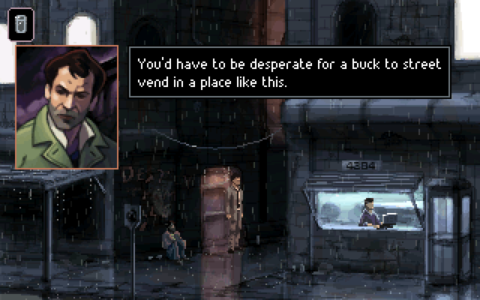
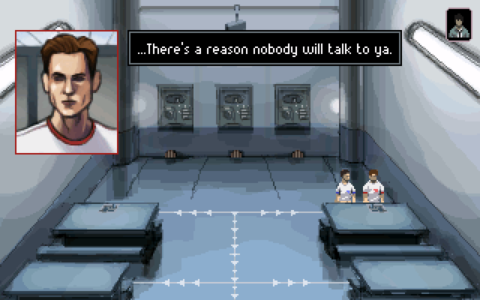
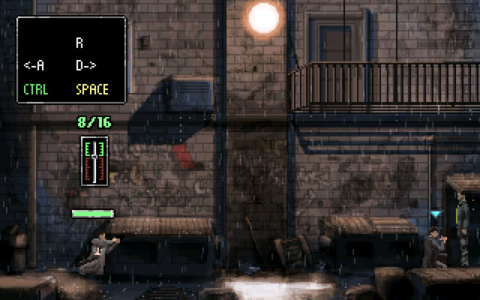
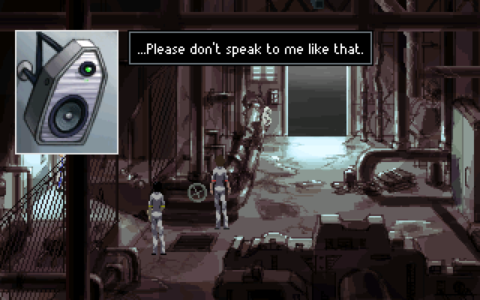

 Posts
Posts